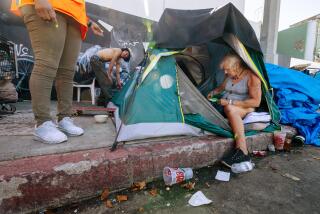Mayor Bass’ ambitious housing program calls on L.A.’s wealthy. Can she pull it off?

- Share via
Los Angeles has always been a city of extremes, but the homelessness crisis is exposing the divide between rich and poor in startling ways.
A-listers in designer gowns and million-dollar jewels parade down the red carpet, blocks from tents where people live in unsanitary conditions. Private jets take off at Van Nuys Airport, soaring over streets lined with RVs and crowded apartment complexes.
Rising housing prices are turbocharging the finances of homeowners while leaving others unable to afford a roof over their heads.
Now, Mayor Karen Bass is calling on L.A.’s wealthy residents to help narrow that economic chasm with a new initiative that will rely on private donations and loans to buy apartments for the city’s unhoused, who at last count numbered more than 46,000.
Philanthropic and real estate leaders reacted with hope and skepticism to the initiative, LA4LA, which Bass unveiled Monday during her State of the City address. LA4LA will target corporations and foundations as well as individuals.
While Bass’ allies applauded her work on homelessness, others privately questioned how far the donations raised by LA4LA would go, arguing that billions are ultimately needed to fix the problem.
Bass’ campaign comes as wealthy Democratic donors in Los Angeles — some of the same people the mayor is counting on to open their wallets — are hyperfocused on raising money for President Biden’s reelection campaign.
And city taxpayers of all income levels have already funded billions of dollars in spending to reduce homelessness, even as the population on the streets and in temporary housing has continued to increase.
Donna Bojarsky, co-founder of a nonprofit dedicated to building civic culture in L.A., predicts that Bass’ deep commitment to alleviating homelessness will spur people to give to LA4LA.
“People are a little less cynical, because she has shown that things can be done,” said Bojarsky, pointing to Bass’ executive order speeding up affordable housing construction and other programs led by her office.
LA4LA leaders said the initiative will target a specific need amid the much larger homelessness crisis.
Bass’ signature homelessness program, Inside Safe, has cleared some encampments and moved some unhoused Angelenos into hotel and motel rooms. But many people remain in those rooms with nowhere else to go.
Bass has said that she initially expected Inside Safe participants to spend three to six months in temporary housing, only to realize that, for many, those stays would last one to two years because of a dearth of affordable housing.
LA4LA will target financially distressed multifamily properties that are approved but not yet constructed, properties that are close to opening or properties struggling with high vacancies, with the goal of turning them into affordable housing.
Because LA4LA is a philanthropic venture — overseen by the California Community Foundation, a charitable group — it will be able to offer financing at lower interest rates than a bank, LA4LA leaders said. In certain scenarios, according to LA4LA lead strategist Sarah Dusseault, investors will be offered a small return.
Creating more apartments will also allow the city to take advantage of federal housing vouchers that are now going unused because there is nowhere to house people.
The city has had to return some voucher money to the federal government, frustrating officials.
Hollywood mogul Jeffrey Katzenberg, one of LA4LA’s leaders, has already donated $300,000. He told The Times in a written statement that the initiative uses “the flexibility of philanthropy to activate housing units fast, for those who need it now.”
So far, LA4LA has raised more than $10 million, Dusseault said.
LA4LA is modeled after a similar program in Atlanta that has raised $150 million from philanthropic groups, corporations and individuals. The program provides loans and grants to developers of mixed-income housing that includes affordable units.
Sarah Kirsch, managing director of affordable housing funds at the Community Foundation for Greater Atlanta, said that one of the funds offers investors a 3% return.
While they could get a higher return elsewhere, corporations and other investors are interested in helping create a city where their employees can afford to live, she said.
“We measure return on investment beyond just the financial return,” said Kirsch.
LA4LA is already partnering with the Housing Authority of the City of Los Angeles, a state-chartered agency that administers the city’s public housing developments, to provide loans to buy buildings.
HACLA Chief Executive Douglas Guthrie said that the authority is close to purchasing buildings using LA4LA financing and anticipates closing on new apartment units by early fall.
Outside donors want to help with the crisis, and they “just need to know how,” said Guthrie. “We’re trying to give them avenues to do that.”
Other philanthropic groups are already tapping wealthy donors to help with homelessness, among them the Mayor’s Fund, a separate nonprofit affiliated with Bass that focuses on preventing people from falling into homelessness.
Stephanie Klasky-Gamer, president and CEO of LA Family Housing, a homeless services provider and affordable housing developer, also courts donors.
Bass and her team on LA4LA will probably have access to individuals and corporations that groups like hers don’t have, Klasky-Gamer said.
She called Bass “aggressive and committed” but also talked about the reality of homelessness.
“We are raising more money privately and publicly, we’re assisting more people, yet there are more people falling into homelessness, and that becomes deflating,” Klasky-Gamer said.
Housing remains prohibitively expensive in Los Angeles, hampering city efforts to acquire units.
Bass, at a recent town hall hosted by KNX News, revealed that she had launched a failed “crusade” to purchase a partially completed downtown skyscraper, which became a national spectacle after it was tagged with graffiti on just about every floor, and use it for affordable housing. An estimate for the unfinished building came in at $850 million, she said, and it would probably have to be torn down.
Jay Lybik, national director of multifamily analytics at CoStar, a commercial real estate data provider, said LA4LA’s model makes “complete sense” in light of concerns about the multi-unit housing market.
“If there ends up being distress for multi-family [buildings], it’s a way to keep as much housing as they can,” he said.
Vacancy rates are rising in the luxury apartment market in Los Angeles County, and it’s taking longer to lease those units, according to CoStar data.
Building owners also may be struggling with rising interest rates, real estate experts said.
Gregory Harris, executive managing director at Institutional Properties Advisors, was more circumspect. He called LA4A a “noble” idea but said that financially distressed projects in Los Angeles are “few and far between.”
There are usually multiple bidders when projects come up for sale, Harris said.
Stuart Waldman, president of the Valley Industry and Commerce Assn., said he expects the business community to give to LA4LA.
Bass’ push for private donations makes more sense than going back to the ballot box, he said.
Over the last decade, voters have approved Proposition HHH to build homeless housing, Measure H to deliver homeless services and Measure ULA to keep people from slipping into homelessness.
Civic leaders are now looking to double the size of Measure H, moving it from a quarter-cent sales tax to a half-cent.
Waldman pointed to the narrow passage of Gov. Gavin Newsom’s $6.4-billion bond measure to overhaul California’s mental health system in the recent March election as an example of voters’ wariness about funding more homeless services.
“People are tired and done with it,” said Waldman. “The only way they are going to get any more money is through private donations.”
Times staff writer David Zahniser contributed to this report.
More to Read
Sign up for Essential California
The most important California stories and recommendations in your inbox every morning.
You may occasionally receive promotional content from the Los Angeles Times.











